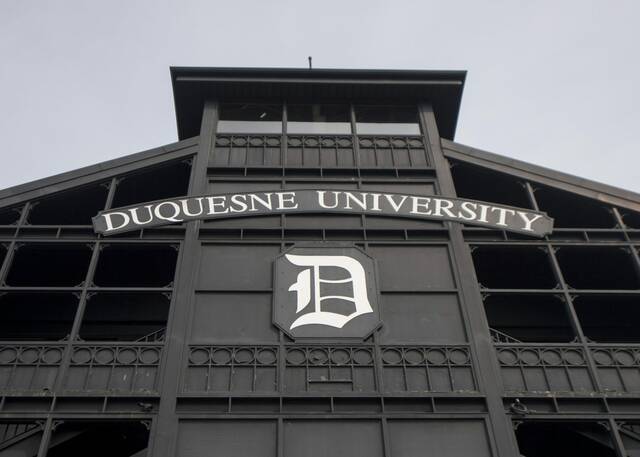Survey asks Duquesne students about race, gender, sexuality as classroom topics
Students at Duquesne University received emails this month asking them to take a short survey to identify topics — such as race, gender and sexuality — that can make them uncomfortable when raised in class.
It asks them to describe cases where professors responded well or poorly.
“Recently, students have expressed to the Student Government Association concerns about topics discussed in the classroom around issues such as eating disorders, homophobia, violence, etc.,” the email read.
It said the survey’s goal “is not to completely censor topics as we must discuss difficult things in academia,” but rather to determine what topics professors “may need to navigate with more care.”
On college campuses, as in society, issues of climate and inclusion are fraught. Flashpoints are seemingly everywhere from lecture halls to recreation venues. Duquesne itself has faced incidents the last few years, including a professor sanctioned over using a racial slur in a Zoom class in 2020 and blowback on the Catholic campus over ads in 2018 for a gender neutral fashion show featuring a man wearing a dress.
Related stories:
• Duquesne professor placed on leave for using racial slur during lesson
• Attorney: Duquesne’s ‘knee-jerk’ move to oust professor for using racial slur threatens academic freedom
• Duquesne fires professor
Still, it was not clear from the survey’s authors or the university this week what specific incidents prompted the student government association to approach thousands of students, asking them to respond before leaving for Thanksgiving break.
Student government president Jessica Schmitz, a senior majoring in political science and economics, declined Thursday to talk about the matter, referring to university officials questions about the SGA online survey.
It asked respondents to choose among a list of potentially uncomfortable topics that included gender, race, diet/eating disorders, mental health and violence, also allowing them to identify something not on that list.
Gabriel Welsch, a university spokesman, said Thursday that officials aren’t sure what sparked the survey. “We’ve asked ourselves. We don’t know.”
He said it appeared to be a well-meaning if flawed effort that deviated from standard practices at the university for structuring questions and zeroing in on only the intended audience.
Duquesne has about 8,300 students in total, but he could not say if the survey went to only undergraduates. Either way, some administrators were copied on the invitation to take the anonymous survey, potentially lessening control over who could respond.
“That’s how it came to our awareness,” Welsch said.
The various questions themselves and ways students could respond offered the possibility that those filling out the survey, or those mentioned in it, might be identified.
One Duquesne student said she was not sure what to make of the survey after she opened her email and started to reach through it.
Giona Ciacco, 19, a sophomore from Greensburg, said she would be in favor of measures to fight discrimination or a hostile class environment, but she said nothing came to mind of late that might have triggered the survey.
“I was very confused by its wording,” said Ciacco, majoring in English writing and minoring in multiplatform journalism. “I actually had to read it two or three times to understand what they were asking.”
Duquesne has a Bias Education Response Team, a multi-disciplinary group on campus whose aim is to educate the campus community, monitor and report on trends and “address bias incidents through restorative practices,” according to its web site.
A call made to officials there was not immediately answered.
Welsch said the student government approached that group for advice on the survey, but apparently used a different approach. He said the survey is intended to be anonymous but it also asks for information such as the school on campus they attend, their ethnicity and academic level. Those characteristics and space left to answer questions presented a chance to inadvertently identify those taking the survey or others mentioned in it.
“That was another problem,” he said.
He said the SGA has done many positive things and said the university was looking at its approach to the survey “as a teachable moment.”
Kathleen Sekula, president of the university’s faculty senate, declined comment.
Remove the ads from your TribLIVE reading experience but still support the journalists who create the content with TribLIVE Ad-Free.

